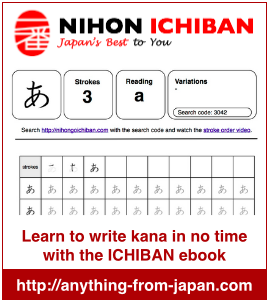Free Download of Kanji Worksheets
When trying to learn Japanese Kanji is always a terrible challenge ! To help all the people wanting to learn Japanese and people who are planning to pass the JLPT N5 Test the NIHON ICHIBAN team created an ebook that you can view and download from here KanjiBookJLPTN5.
Each Kanji is represented on one page featuring :
- The meaning
- The Onyomi and Kunyomi readings
- Vocabulary that includes this Kanji
- The number of strokes and the strokes order ( along with a link to the NIHONGO ICHIBAN website to see the video of the stroke order)
- The Radical (components) of the Kanji
- A Hint to help memorize the Kanji
- A grid to exercise writing
You can print the Kanji book pages as many times as you want and practice the writing !
Most important this ebook has NO COPYRIGHT so you may feel free to use as many times as you want and to SHARE IT with whoever you want!





